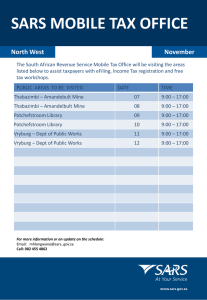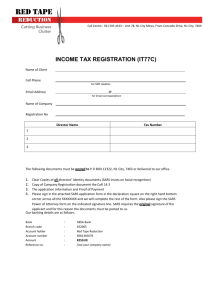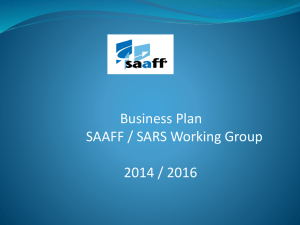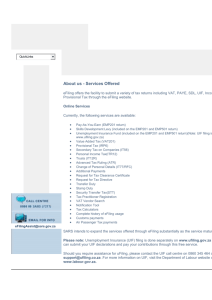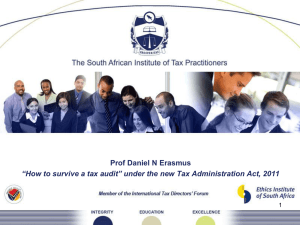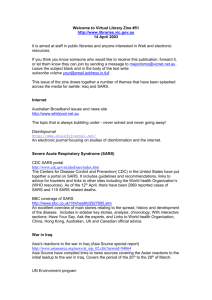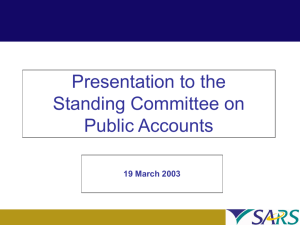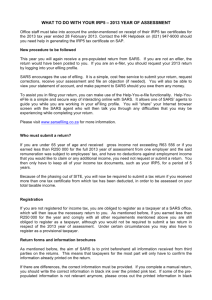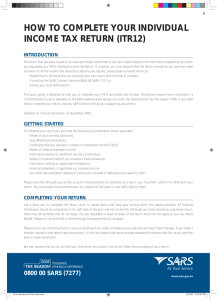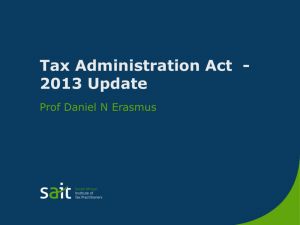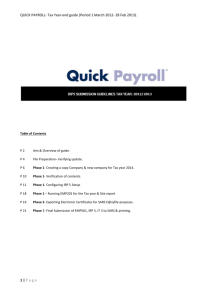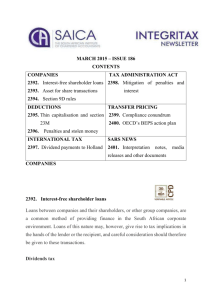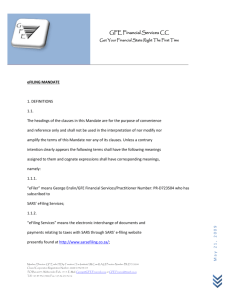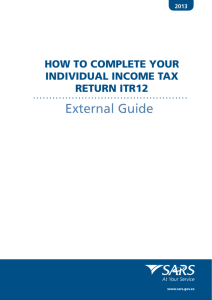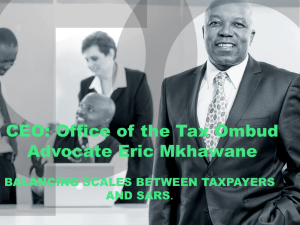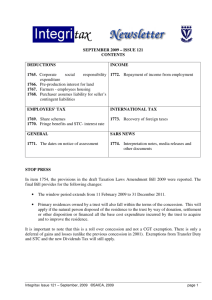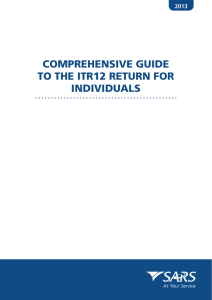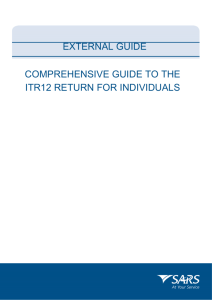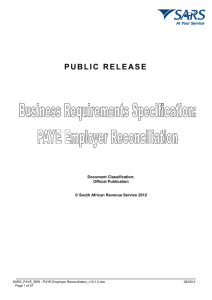Income Tax Act 58 of 1962 - National Department of Tourism
advertisement
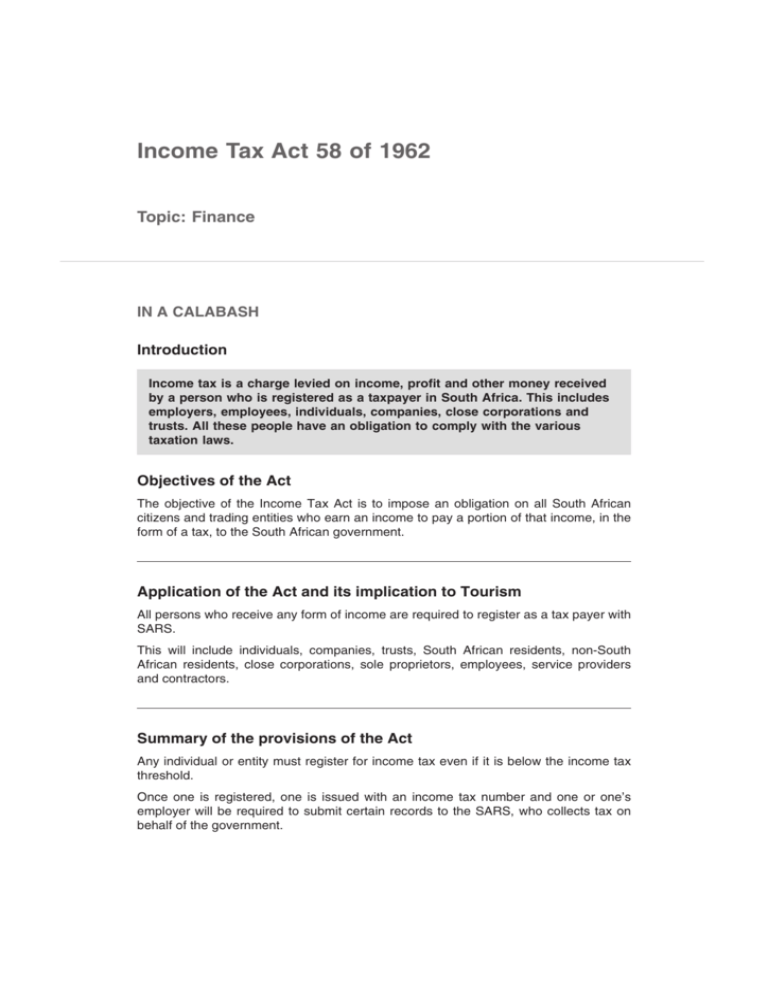
Income Tax Act 58 of 1962 Topic: Finance IN A CALABASH Introduction Income tax is a charge levied on income, profit and other money received by a person who is registered as a taxpayer in South Africa. This includes employers, employees, individuals, companies, close corporations and trusts. All these people have an obligation to comply with the various taxation laws. Objectives of the Act The objective of the Income Tax Act is to impose an obligation on all South African citizens and trading entities who earn an income to pay a portion of that income, in the form of a tax, to the South African government. Application of the Act and its implication to Tourism All persons who receive any form of income are required to register as a tax payer with SARS. This will include individuals, companies, trusts, South African residents, non-South African residents, close corporations, sole proprietors, employees, service providers and contractors. Summary of the provisions of the Act Any individual or entity must register for income tax even if it is below the income tax threshold. Once one is registered, one is issued with an income tax number and one or one’s employer will be required to submit certain records to the SARS, who collects tax on behalf of the government. The collection of income tax Income tax is paid over a calendar year, known as the year of assessment. The year of assessment for taxpayers covers a period of 12 months. Each registered taxpayer must submit an annual income tax return, unless • his or her remuneration was less than R120 000 for the year; • his or her remuneration was from a single employer; • he or she was not paid an allowance and no PAYE was deducted from this in regards to a travel allowance. Registration The following persons must register as taxpayers: • A person earning some form of income, even if less than R120 000; • A person earning an annual salary of over R120 000 a year (PAYE employees)—after deductions of contributions to pension funds and retirement annuities; • A person earning less than R120 000 a year (SITE employees)—only when allowances (travel, medical aid, etc.) are included in their remuneration; • A person earning investment income (interest) of more than R11 000 per year; • A person earning rental income; • A person earning business income; • A person who receives a travel or public office allowance as part of their salary; and • Members of close corporations and Directors of Companies. You can register for income tax at a SARS office by completing an IT 77 form. You will need a copy of your ID and an IRP5 form. Your registration will be confirmed within 21 working days and you will be issued with a tax reference number. SITE and PAYE There are two main types of tax that are deducted from an employee’s salary or wages– • SITE (Standard Income Tax on Employees); and • PAYE (Pay As You Earn). If one earns more than R27 000 per year, one pays SITE tax, which is deducted from one’s salary every week or month. One’s employer must work out how much needs to be deducted. If one earns more than R60 000 per year, one will pay SITE tax on the first R60 000 and then PAYE on everything that one earns over and above R60 000. The amount of PAYE one pays depends on how much one earns and is calculated from tax tables issued by the South African Revenue Service. Tax returns Once a year, one’s employer will give one an IRP5 tax certificate that shows the total amount that one earned and the total tax that was deducted. If one earns more than R60 000 a year, one must complete a tax return and send it with one’s IRP5 certificates to SARS. One must register with SARS before one completes a tax return. If one is already registered, one’s tax return forms will be sent to one in the post. One can also collect the forms from one’s nearest SARS office. One can also receive and submit one’s tax returns electronically using the SARS eFiling system. eFiling is an electronic tax return and submission service. One can register for eFiling if one is already registered as a tax payer. One will need one’s tax reference number and ID number. One will receive detailed instructions on how to complete the tax return with the forms. When one submits one’s return, SARS will check that one has paid the correct amount of tax. If one has paid too much tax, one will get a refund. If one has not paid enough tax, one will be asked to pay the outstanding amount. One can also collect a copy of the forms from one’s nearest SARS office. Corporate income tax (CIT) Any company or any close corporation (CC) which becomes liable for normal tax or becomes liable to submit a return of income in terms of the Act is required to register as a taxpayer. Any such person must register as a taxpayer at SARS within 60 days after so becoming a taxpayer by completing an IT77(C) form. A registered taxpayer is required to complete and submit the annual returns of income in a prescribed form within the stipulated period. The following entities are required to register as taxpayers for CIT purposes– • listed public companies; • unlisted public companies; • private companies; • close corporations; • co operatives; and • others, such as small business corporations (entities with an annual turnover of less than R14 million). Companies, including CCs, co operatives and bodies corporate, are taxed at a rate as announced in the budget speech in February of each year. They are required to submit a ‘Return of Income: Companies and Close Corporations (IT14)’ within 12 months from the date on which their financial year ends. WHAT HAPPENS IF YOU DO NOT COMPLY? Failure to pay tax will result in a criminal offence resulting in heavy fines and/or imprisonment. RECOMMENDED ACTIONS OR CONTROLS WHICH SHOULD BE IMPLEMENTED BY THE TARGET AUDIENCE TO ENSURE COMPLIANCE WITH THE ACT • Registration as a tax payer and receipt of tax number; • Payment of the various taxes due to SARS as assessed and levied under the Act; • Trading entity to obtain tax clearance certificate; • Payment of PAYE and SITE on behalf of employees; • Submission of tax forms; and • Annual assessment and payment of any levied taxes due. FURTHER INFORMATION Regulator South African Revenue Service Website www.sars.gov.za
